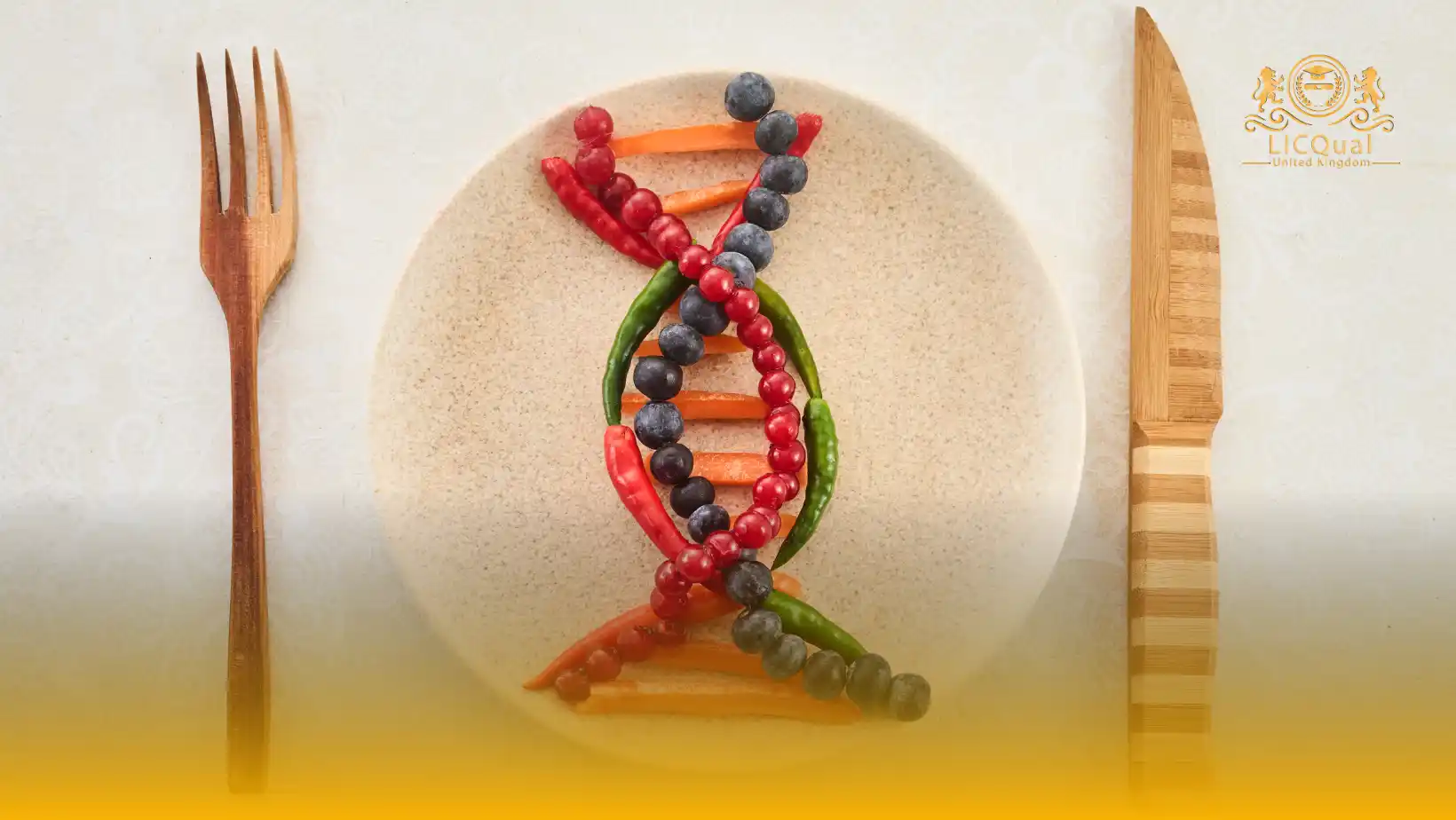The LICQual Level 6 Diploma in Clinical Nutrigenomics (Dip Nutrigenomics) is an advanced qualification designed for professionals who wish to specialise in the emerging field of nutrigenomics—the study of the interaction between nutrition and genetics. This diploma equips learners with the knowledge and practical skills to understand how genetic variation affects nutrient metabolism, dietary requirements, and individualised health outcomes.
This qualification is ideal for dietitians, nutritionists, healthcare practitioners, and allied health professionals seeking to enhance their career prospects, expand their scientific expertise, and fulfil Continuing Professional Development (CPD) requirements. Learners will gain insight into the principles of genetic testing, gene-diet interactions, personalised nutrition strategies, and the application of nutrigenomics in clinical practice. The programme emphasises evidence-based approaches, enabling learners to integrate scientific knowledge with practical dietary interventions for personalised patient care.
Centres delivering the Level 6 Diploma in Clinical Nutrigenomics must ensure high-quality education by employing competent and qualified staff, providing access to all necessary learning materials, and offering a supportive learning environment. Structured teaching, case studies, practical exercises, and assessments equip learners with the competence and confidence required to apply nutrigenomic principles in professional practice effectively.
By completing the LICQual Level 6 Diploma in Clinical Nutrigenomics, learners will enhance their professional knowledge, strengthen their analytical and practical skills, and position themselves as specialists in personalised nutrition, advancing their careers within clinical, research, and healthcare settings.
Course Overview
Qualification Title
LICQual Level 6 Diploma in Clinical Nutrigenomics (Dip Nutrigenomics)
Total Units
6
Total Credits
120
GLH
480
Qualification #
LICQ2201071
Qualification Specification
To enroll in the LICQual Level 6 Diploma in Clinical Nutrigenomics (Dip Nutrigenomics) , applicants must meet the following criteria:
|
Qualification# |
Unit Title |
Credits |
GLH |
|---|---|---|---|
|
LICQ2201071-1 |
Principles of Nutrigenomics |
20 |
80 |
|
LICQ2201071-2 |
Human Genetics and Molecular Biology |
20 |
80 |
|
LICQ2201071-3 |
Nutrient Metabolism and Gene Expression |
20 |
80 |
|
LICQ2201071-4 |
Clinical Applications of Nutrigenomics |
20 |
80 |
|
LICQ2201071-5 |
Food Safety, Quality, and Regulation |
20 |
80 |
|
LICQ2201071-6 |
Research Methods, Data Analysis, and Interpretation |
20 |
80 |
By the end of this course, learners will be able to:
Unit 1: Principles of Nutrigenomics
By the end of this unit, the learner will be able to:
- Explain the fundamental principles of nutrigenomics and personalised nutrition
- Analyse gene-diet interactions and their impact on individual health outcomes
- Evaluate the role of nutrigenomics in public health and clinical practice
- Discuss ethical considerations associated with genetic testing and personalised nutrition
Unit 2: Human Genetics and Molecular Biology
By the end of this unit, the learner will be able to:
- Describe the structure and function of DNA, RNA, and proteins in human biology
- Analyse genetic variations and polymorphisms that affect nutrient metabolism
- Explain inheritance patterns and genetic predisposition to nutrition-related conditions
- Apply molecular biology techniques to support research in nutritional genomics
Unit 3: Nutrient Metabolism and Gene Expression
By the end of this unit, the learner will be able to:
- Explain the mechanisms by which nutrients influence gene expression
- Analyse the effects of macronutrients and micronutrients on metabolic pathways
- Evaluate the role of epigenetics in health, disease, and personalised nutrition
- Apply knowledge of nutrient-gene interactions to develop tailored dietary strategies
Unit 4: Clinical Applications of Nutrigenomics
By the end of this unit, the learner will be able to:
- Assess genetic risk factors related to nutrition and health outcomes
- Design personalised dietary interventions based on genetic information
- Integrate nutrigenomics principles into clinical practice for patient care
- Monitor and evaluate the effectiveness of personalised nutrition plans
Unit 5: Research Methods, Data Analysis, and Interpretation
By the end of this unit, the learner will be able to:
- Apply research methodologies relevant to nutrigenomics studies
- Analyse and interpret genetic and nutritional data for clinical application
- Critically evaluate scientific evidence to inform personalised nutrition decisions
- Utilise evidence-based approaches to improve dietary interventions and outcomes
Unit 6: Professional Practice, Ethics, and CPD in Nutrigenomics
By the end of this unit, the learner will be able to:
- Demonstrate professional, ethical, and legal standards in clinical nutrigenomics
- Apply effective communication and counselling skills with clients and patients
- Plan and engage in Continuing Professional Development (CPD) to enhance expertise
- Develop professional competency in applied nutrigenomics within clinical practice
The LICQual Level 6 Diploma in Clinical Nutrigenomics (Dip Nutrigenomics) is designed for professionals seeking advanced knowledge and practical skills in personalised nutrition and gene-diet interactions. This course is ideal for:
- Dietitians, nutritionists, and healthcare practitioners aiming to specialise in nutrigenomics
- Clinical professionals seeking to integrate genetic information into personalised dietary plans
- Biomedical scientists and allied health professionals involved in nutrition research or patient care
- Public health practitioners focusing on population-based nutrition and genetic risk management
- Professionals aspiring to consultancy, advisory, or research roles in personalised nutrition and nutrigenomics
- Individuals committed to Continuing Professional Development (CPD) and career advancement in clinical nutrition and genomics
- Learners seeking to develop analytical, research, and practical skills for applying nutrigenomic principles in professional practice
This course is suitable for learners who are motivated to enhance their professional knowledge, strengthen clinical and research competencies, and advance their careers in the emerging field of nutrigenomics and personalised nutrition.
To deliver the LICQual Level 6 Diploma in Clinical Nutrigenomics (Dip Nutrigenomics) effectively, centres must meet the following requirements to ensure high-quality training and learner success:
- Qualified and Competent Staff: All teaching and assessment staff must hold relevant qualifications in nutrition, dietetics, genetics, biomedical science, or related healthcare and scientific fields, with substantial professional experience. Staff should be capable of delivering Level 6 curriculum content and supporting learners in achieving their learning outcomes.
- Comprehensive Learning Resources: Centres must provide learners with access to essential learning materials, including textbooks, scientific journals, genetic and nutritional databases, laboratory equipment (where applicable), and online research platforms to support practical exercises, case studies, and assessments.
- Facilities and Equipment: Centres should have classrooms, seminar rooms, and practical spaces suitable for interactive learning, laboratory work, and workshops. Access to IT resources, computers, and reliable internet connectivity is essential.
- Assessment and Quality Assurance: Centres must implement robust assessment procedures aligned with Level 6 standards, ensuring assessments are valid, reliable, and fair. Quality assurance processes should monitor teaching effectiveness and learner progress.
- Learner Support: Centres should provide guidance on study skills, access to tutors, and advice on professional development opportunities to support learners throughout the programme.
- Commitment to Continuing Professional Development (CPD): Centres must encourage CPD for both staff and learners, promoting ongoing skill development and career progression in nutrigenomics and clinical nutrition.
- Regulatory Compliance: Centres must adhere to all relevant health, safety, and educational regulations, ensuring a safe, professional, and conducive learning environment.
Meeting these requirements ensures learners receive high-quality education, develop advanced competencies in clinical nutrigenomics, and achieve their full potential in research, personalised nutrition, and healthcare practice.
Assessment and Verification
All units within this qualification are subject to internal assessment by the approved centre and external verification by LICQual. The qualification follows a criterion-referenced assessment approach, ensuring that learners meet all specified learning outcomes.
To achieve a ‘Pass’ in any unit, learners must provide valid, sufficient, and authentic evidence demonstrating their attainment of all learning outcomes and compliance with the prescribed assessment criteria. The Assessor is responsible for evaluating the evidence and determining whether the learner has successfully met the required standards.
Assessors must maintain a clear and comprehensive audit trail, documenting the basis for their assessment decisions to ensure transparency, consistency, and compliance with quality assurance requirements.







